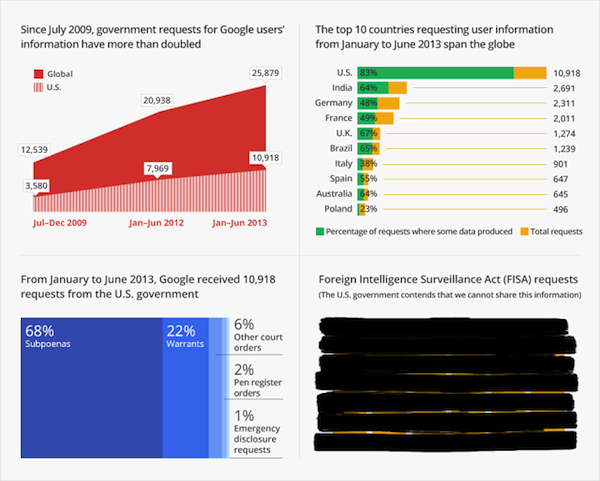
Governments requested data over 25,000 times from Google in the first six months of 2013, the search giant has revealed.
Data released by Google as part of its twice-yearly transparency report shows that requests rose from 21,389 to 25,879 between the second half of 2012 and the first half of 2013.
In total 42,500 user accounts were targeted and Google said 65 percent of requests led to some data being given up. This suggests at least 16,770 accounts were affected although it could be as high as 27,000.
While the number of requests rose Google said the number of times it complied with the demands is the lowest since it started producing data on how often it releases information on its users.
Overall, the number of requests received is double the number of requests made in the first half of 2009 (12,539) when Google first started reporting government data requests and comes amid major concerns at the extent of web spying, as revealed by the PRISM scandal.
The U.S. dominated the number of requests Google received:
- US: 10,918 requests – 83 percent led to some data being handed over.
- India: 2,691 requests – 64 percent led to some data being handed over.
- Germany: 2,311 requests – 48 percent led to some data being handed over.
- France: 2,011 requests – 49 percent led to some data being handed over.
- UK: 1,274 requests – 67 percent led to some data being handed over.
Google also used the release of its latest transparency report to highlight its ongoing concerns with the fact requests under Foreign Intelligence Surveillance Act (FISA) laws cannot be revealed. It included a blacked-out chart to demonstrate this gag (pictured above).
Richard Salgado, legal director for law enforcement and information security at Google, said the firm wanted to reveal this information but was forbidden from doing so.
“We believe it’s your right to know what kinds of requests and how many each government is making of us and other companies,” he wrote in a blog post. “However, the US Department of Justice contends that US law does not allow us to share information about some national security requests that we might receive.”
Google and other tech giants have started demanding the right to reveal this information, as they attempt to use public outrage from the PRISM spying scandal to push for greater transparency on the data requests they receive.
This article was originally published on V3.
